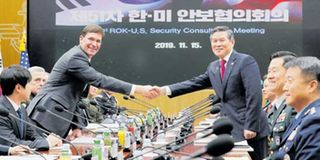Dialogue key in solving Korea, Japan diplomatic tension

South Korea will reconsider the termination of the military intelligence-sharing pact with Japan—the General Security of Military Information Agreement (Gsomia)—if Japan scraps export curbs, Seoul’s defence ministry said on Thursday.
Mr Choi Hyun-soo, South Korea defence ministry spokesman told a press briefing that there has been no change in South Korea’s position that the country will review various measures, including the GSOMIA, if Japan withdraws, what South Korea terms as unfair, retaliatory measures.
South Korea’s decision to scrap military intelligence information sharing agreement with Japan is still a hot topic as far as bilateral relations of the two neighbours are concerned.
Gsomia was signed in 2016 under former South Korean President Park Geun-hye to allow for more seamless intelligence sharing between the two allies and the United States regarding North Korea’s activities in the region.
Much has been said about the decision since South Korea notified Japan in August 2019.
The move was met with mixed reactions in both Seoul and Tokyo. In Tokyo, local television suspended regular programming to bring the breaking news of the South Korean decision.
Scrutinising events prior to the Korea decision, some analysts think Seol had justification to resort to the measure. Japan’s decision to sanction export restrictions of key raw materials for producing semi-conductors was just the beginning of the episode.
Japan also blacklisted Korea as one of the preferred trade partners. This was a slap on Korea’s face. This drew the reaction whereby Seoul moved to terminate GSOMIA, one of the many measures it could deploy.
The retaliatory measures between the two countries of course will not have good ending not only for the two countries but also the global trading community.
Korean authorities suggest that they have tried to reach out to their Japanese counterparts so as to find an amicable solution to their differences, but Tokyo has remained adamant demanding Korea drops the compensation claims that emanate from a court ruling that required Japan to compensate victims of the colonial era.
In its statement made public, South Korea’s presidential Blue House said maintaining the Japan-Korea Gsomia agreement is not in the national interest.
“The Government of the Republic of Korea has decided to terminate the agreement between the government of the Republic of Korea and the Government of Japan on the Protection of Classified Military Information [Gsomia], and in accordance with its provisions, will notify the government of Japan through diplomatic channels before the extension deadline,” the Blue House said.
South Korea said in the statement that Japan’s decision to remove Korea from its ‘white list’ of preferred trading partners in July and initiate trade restrictions were reasons for the decision to suspend cooperation on security.
“The rationale was that a national security problem had arisen due to a breach of trust, yet no concrete evidence to support those allegations was presented,” by Japan, Seoul said.
“Under these circumstances, the Government of the Republic of Korea decided that maintaining this Agreement, which was signed to facilitate the exchange of sensitive military information, does not serve our national interest.”
Lee In-young, a South Korean lawmaker with the ruling Democratic Party said the decision reflects the need to uphold national interest, the “will of the people,” and a “changing security environment.”
The news of the cancellation may have taken Japan by surprise, according to South Korean television network MBC.
Local television channels in Japan suspended regular programming to break the news of the agreement’s termination, the report said.
Intelligence South Korea shared with Japan likely included screening and video information collected by reconnaissance aircraft, and information obtained by intercepting wireless communication originating from North Korean military facilities.
The way the situation is now, no one country can solve the crisis, it is only through amicable discussions between the two countries is where lasting solutions could be achieved.
Korea and Japan need each other so they should look back on their harder times in the past and have an unconditional high-level meeting as soon as possible.
Korea has shown many cards to restore the relationship between the two nations. US either does not want to see the dispute between two neighbours.
Then what would be the final answer from Japan? We all expect all the concerns should be solved soon by starting with dialogues.




